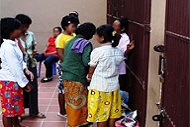Underage Cambodian Domestic Workers Rescued From Malaysia
Published on 30 September 2010"I was told by the company that I could earn $ US 180 per month as a domestic helper in Malaysia. During the first six months my salary would be deducted to cover the expenses of the company. I thumb-printed the documents without knowing their content, and the company did not give me any copies or explain anything in detail to me. But I know that the company changed everything. In fact, the company changed my name and age in the documents, and I was told to use the name of my older sister."
This is an account of an underage girl who was sent to work as a domestic worker in Malaysia where she was mistreated with other Cambodian maids. Channa (not her real name) was brought up in Koh Kong province in a poor family. She met with a representative of a licensed recruitment agency who promised to give her a highly paid job in Malaysia. She was underage, but the company facilitated falsified documents including a passport, visa and other necessary documents so that she could be sent to work abroad.
Initially, the girl was required stay at a training center provided by the agency where she received pre-departure training on housework before being sent out. The company provided a loan of 1 million Riel to the girl's family. The first installment was made after a blood test and the remainder was paid at the airport.
In Malaysia
In April 2010, a team of girls arrived in Malaysia from different agencies in Cambodia. They were taken by a local company in Kuala Lumpur where they were provided further training before being sent to work with Malaysian families as domestic workers. The girls reported that the staff members of the local company were very rude, insulted them and subjected them to ill-treatment.
Because of this, the girls decided to run away from the company and sought refuge in a church. Church officials had notified Tenaganita (a Malaysian NGO and LICADHO partner), which admitted the 13 girls to one of its shelters. The church also informed the police, which filed a report about the incident on May 13, 2010.
A spokesperson for the group testified that the passports of the female migrants were kept by the company, and that they did not receive employment contracts. She also said that there were discrepancies between the real ages of the female migrants, and the ages as documented in their respective passports, stating that "some of us are 18 years and below; we are between 15 to 30 years old." They asked for assistance from Cambodian Embassy and requested that Malaysian police conduct investigation on this case.
Underage Girls Returned Home
In collaboration with Tenaganita, LICADHO was able to send three under-age girls from Kuala Lumpur to Phnom Penh on June 16, 2010. Tenaganita asked LICADHO to receive the girls at the airport and to inform their families so that they could be picked up and taken home. Tenaganita staff accompanied the girls to the airport in Malaysia. They also asked Cambodian students from Kuala Lumpur - whom they met by coincidence and who were returning to Phnom Penh on the same flight - to look after them. They wanted to ensure that upon arrival the girls were met by LICADHO staff, and not being taken away by representatives of the Cambodian recruitment agency. During the flight the students spoke with the girls, and after hearing their stories, they actively assisted at the airport in Phnom Penh to ensure the girls were not handed over to staff of the recruitment agency.
With the assistance of LICADHO all three girls returned home to their provinces with their families.
In recent years, LICADHO has received a growing number of case reports related to labor migration. Up to now, LICADHO has rescued 83 victims. Poor and mostly illiterate families from rural areas of Cambodia have contacted the organization with reports of human rights abuses involving illegal or exploitative labor brokerage practices by licensed or unlicensed Cambodian recruitment agencies. These cases have included abuses and irregular dealings in Cambodia as well as in receiving countries by business partners of the Cambodian recruiters and employers of the migrant workers.
LICADHO urges the government to conduct further investigations into the practices of such domestic labor companies, given that there is evidence of illegal labor recruitment procedures involving the sending of children, which could be considered as human trafficking.








